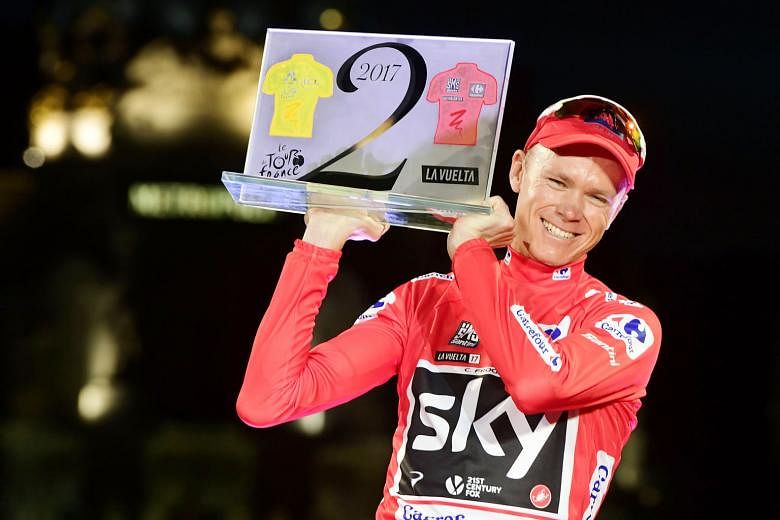LONDON • Pat McQuaid, the former head of cycling's world governing body, believes it would be very hard for Chris Froome to avoid a ban as the four-time Tour de France winner prepares to front up to his adverse drugs test.
Froome, one of 12 nominees for the BBC's annual Sports Personality of the Year show, had never planned to attend today's ceremony in Liverpool.
But the Team Sky rider will appear via a live satellite link and is understood to be prepared to answer questions about the controversy.
The 32-year-old, training with Team Sky in Mallorca, had double the permitted level of the asthma drug salbutamol in his urine in a test during his La Vuelta Tour of Spain win in September.
He has insisted that he stayed within the permitted dose of salbutamol and is preparing evidence to back his claim.
Still, McQuaid expects Froome to receive a ban and said his failed drug test was a disaster for cycling.
-
TOUR DE FRANCE WINNERS BANNED FOR DOPING
- LANCE ARMSTRONGThe American was stripped of his seven Tour titles from 1999 to 2005 for doping.FLOYD LANDISThe American was stripped of the title after testing positive for elevated levels of testosterone during the 2006 race.JAN ULLRICHThe 1997 champion was banned by the Court of Arbitration for Sport (CAS) for two years in 2012 and the German later admitted to blood doping.ALBERTO CONTADORThe Spaniard was stripped of the title after testing positive for a banned anabolic agent during the 2010 race.
FROOME CASE: LESSONS FROM PRECEDENTS
ALESSANDRO PETACCHIThe Italian sprinter was banned for 12 months by the CAS and stripped of his five 2007 Giro d'Italia stage wins. At that time a therapeutic use exemption (TUE) was required to use salbutamol. He had one but exceeded the maximum limit of 100ng/ml by 320mg.DIEGO ULISSIThe Italian recorded 1,900ng/ml of salbutamol during the 2014 Giro d'Italia and was banned for nine months by the Swiss Olympic Committee as he resided in Switzerland. As part of his defence, he argued that a crash during the race had caused the rise in his levels. He could have had a two-year ban. He also underwent tests to see if something about his metabolism led to the high values, but they proved unsuccessful for him.LEONARDO PIEPOLIReportedly recorded a finding similar to countryman Petacchi's, but escaped a ban after his explanation was accepted. Later banned after testing positive for the blood-boosting drug EPO (erythropoietin).MIGUEL INDURAINThe five-time Tour de France champion registered an adverse finding at the Tour de l'Oise in 1994. The substance was allowed by the UCI, but on a French banned list. However, the French cycling federation failed in its attempt to get the Spaniard banned.REUTERS, THE TIMES, LONDON
"I don't see how Chris Froome can turn around like he did and say, 'I played by the rules, I broke no rules'," said the International Cycling Union president between 2005 and 2013.
"The fact is, his urine sample was twice the permitted limit. It's up to him to go and prove that he could have done otherwise."
Froome's problem is that he has been using salbutamol for many years in different conditions, and he needs to explain why there has suddenly been this spike in the drug's levels.
McQuaid, who was heavily criticised for his handling of doping issues in a 2015 report, thinks the issue could cause irreparable damage to the reputation of the British team run by Dave Brailsford.
It was only a few weeks ago that UK Anti-Doping, owing to a lack of accurate medical records, was forced to close its probe into a mysterious Jiffy bag delivered to Team Sky for the use of Bradley Wiggins during the 2011 Criterium du Dauphine.
"They've had a very difficult 15 months, when they set out to be the team that is the clean team, that was going to bring back the credibility of cycling and they certainly have gone in the opposite direction this year," McQuaid told the BBC.
"They are a team with by far the biggest budget in cycling - and they can afford all of the experts and all of the medical back-up and all of the things that a lot of teams can't afford - and they find themselves in this situation today."
"It's going to be very difficult to see how they can come out of this with any credibility at all," he added.
"To be honest with you, it begs a lot of questions."
THE TIMES, LONDON, THE GUARDIAN

